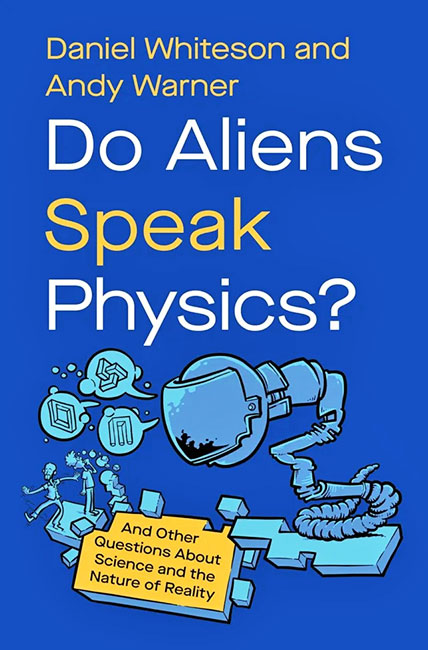Ethan Siegel (ES):
I guess it had never really occurred to me to
think that an intelligent alien species that's capable of
becoming technologically advanced, that's capable of conducting
at least interstellar communication, if not outright
interstellar travel, surely they would have at least uncovered
the same laws of physics that we have here in our technological
infancy in the 21st century.
But as you argue in the book, that
isn't necessarily the case.
Can you sort of explain to us why my
thinking on this might be the naive point of view, and why
intelligent aliens might not have necessarily developed the same
rules of mathematics and the same laws of physics and discovered
the same things that we have here on Earth?
Daniel Whiteson (DW):
Yeah, it's a super fun question to dig into.
And one reason I think it's exciting is that the answer you just
described is very compelling. It's very attractive. It's very
seductive. It suggests that like, as Newton expanded our concept
of physics from the Earth into the heavens, that now we can
describe the whole Universe.
And we think the same laws of
physics apply, you know, to an apple and to the Moon and to
distant galaxies. That also might suggest that the inhabitants
of those galaxies should find those same laws of physics.
Now,
if we meet up, we could have a conversation about physics and
quantum gravity and work together on all of these mysteries that
were part of a galactic community.
That's very exciting and you know that's what I want to be true.
But we should always be skeptical, especially of ideas that are
flattering. That put us at sort of the center of the Universe.
We've made that mistake many times in assuming that there's
something special about us or about Earth.
And so assuming that
the way that we describe the Universe, the way that we explain
the phenomena that we see out there, is the only way to explain
it, might be making that same mistake: might be confusing our
description of the Universe with the Universe itself.
The WISPR data from the Parker Solar Probe, in
monochrome, clearly matches the surface features
seen by the significantly longer-than-optical
wavelengths of the orbiter Magellan, shown in
assigned color.
The view of Venus from the Parker Solar Probe
represents the first time the clouds of Venus have
ever been seen parting, revealing the surface below.
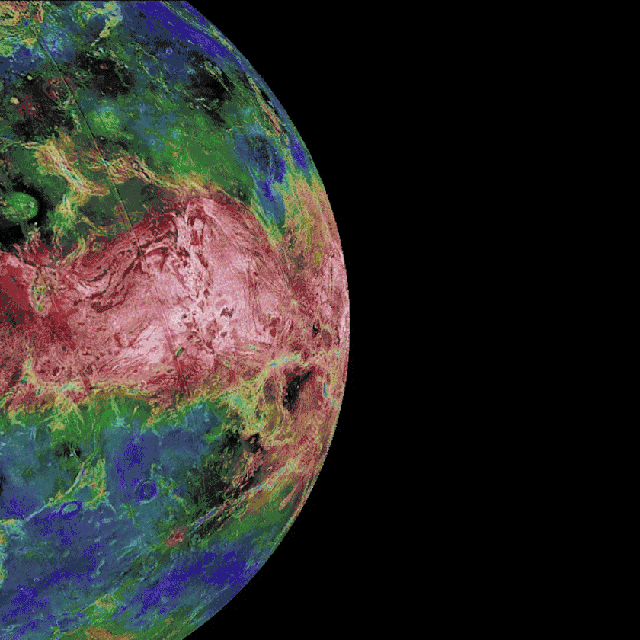
Credit:
NASA/APL/NRL (monochrome);
Magellan Team/JPL/USGS
(color)
ES:
So I can, I can agree with a lot of that on
the surface, certainly, right? When I look at how science has
developed here on Earth, we were of course restricted in the
early days of science to looking at what we could observe or
measure or experiment on with our five senses, right?
If aliens
lived on a very cloudy planet, they might not use astronomy to
sort of uncover what the laws of gravity are, and they might not
make the connection between the things that happen on the
surface of their world and what's happening in the heavens above
them the way Newton did.
But I do like to think that as we've gotten more advanced, as
we've basically, you know, uncovered the types of technologies
that would allow us to leave the bonds of our planet's gravity,
that would allow us to communicate ultra long distances across
the galaxy.
I think, well, surely aliens, even if they formulate
it differently, even if they view it differently, for example,
if they used Heisenberg's matrix mechanics instead of the
Schrodinger equation, or if they used Tomonaga's quantum field
theory formalisms instead of Feynman's or Schwinger's quantum
field theory formalisms, surely they would still find the same
laws of physics, because that's one of the huge things we've
been able to establish, is that the laws of physics that we see
here and now on Earth actually appear to be the same everywhere
and at all times across the Universe.
Would you have a counterargument to make against that point of
view?
DW:
Boy, do I have lots of counter arguments. I
understand that it's hard to imagine things operating another
way or aliens not doing science the way that we do.
But in the
same way, it's hard to imagine, you know, somebody not starting
their morning with coffee or sleeping on a bed the way that I do
or organizing their family structure in a way that's familiar to
me.
And these are cultural choices, obviously, right? But it's
still hard for us to break out of that sandbox and imagine other
ways of living. And so just because it's hard for us to imagine
doesn't mean, of course, that it's impossible.
That's the hard part: trying to break out of that sandbox and
really think about whether other ways are possible, whether our
way of doing it is the only possible way or just the way that
makes sense to us because it's what we're familiar with. So
let's start with what you stated: with perception. Do aliens
perceive the same Universe as we do, and could that influence
their science?
You know, there's fascinating biological
questions here about what senses aliens might natively evolve.
Would they see the same visible spectrum as us? Would they
develop senses for magnetic fields or electric fields?
These are
really fun biological questions that depend on the details of
their environment. And even here on Earth, you can already see
an incredible spectrum. of different kinds of senses that
animals on Earth develop.
We know that there are more senses out there than we humans
have. And we also know more fundamentally that there's a lot of
the Universe that we do not sense, right? Neutrinos we can't
interact with. Dark matter is most of the stuff in the Universe
and we have no senses that let us interact with it.
It's
completely unavailable in our sensorium.
The periodic table of the elements is sorted as it
is (in row-like periods and column-like groups)
because of the number of free/occupied valence
electrons, which is the number one factor in
determining each atom’s chemical properties.
Atoms can link up to form molecules in tremendous
varieties, but it’s the electron structure of each
one that primarily determines what configurations
are possible, likely, and energetically favorable.
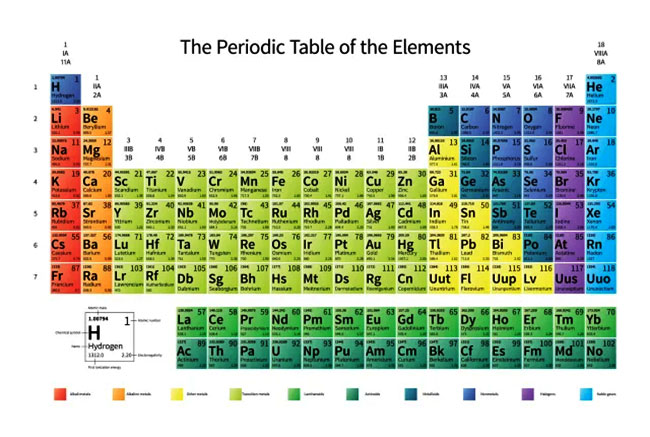
Credit: Adobe Stock
ES:
I still have a hard time believing that
they wouldn't have investigated the same properties of nature,
that they wouldn't have found, for example, that atoms of
different species exist and can be sorted into a type of
periodic table, even if they draw their table differently, that
elements in the same columns have similar properties.
I have a
hard time believing that they wouldn't have gone further and
uncovered what's inside the atom and developed nuclear and
particle physics.
I have a hard time believing that they
wouldn't have found the same force laws governing the Universe,
even if they didn't have a concept of force and just talked
about it as a derivative of a potential or as the impetus
provided by a field or, or some other equivalent formalism.
DW:
You might argue,
"Okay Daniel, we're not just using our raw
senses anymore. We're using technological eyeballs, we can see
in the infrared, we have ultraviolet space telescopes, we've
detected dark matter, we have essentially expanded our ability
to interact with the Universe via technology."
Which is true.
But what I wonder if what we really expanded is our way to
conceive of the Universe, because in your mind your senses build
a model of the Universe.
Like, look at the room that you're in right now. Your vision and
your sound and all of your senses have put together in your head
a model of what's around you. You know that's lacking. You know
that, for example, you're not describing the dark matter or the
neutrinos or most of the electromagnetic radiation that is
around you.
The model you've built is limited. And it turns out
that every time that I think that this affects strongly the way
that we build a model of physics as well, because every time we
develop one of these technological eyeballs, we end up
translating its output back into our native sensorium.
When you look at images from the James Webb Space Telescope, for
example, you don't see them in the raw infrared. They would just
look black to you. Their color is shifted. When we hear about
gravitational waves, they are played to us as sound because
[that's how] we can experience them.
And so I think that there
is a way that we express our understanding of the Universe that
is fundamentally defined or influenced by the senses that we did
natively evolve to, because we tend to translate everything back
into that language. Physics is about explaining the unfamiliar
in terms of the familiar.
We try to express, "what is a photon?"
We describe it in terms
like waves and particles and those sorts of things. None of
these things are fully appropriate because a photon has no exact
intuitive analog.
So all this is to say that I think that our
senses might be different from aliens', and those senses can
really influence the way we think about the physical Universe
and the way we explain it. Not just the model you make in your
head of your room, but also the physical model that we build of
the Universe.
And so I think that's one starting place to wonder
whether our biological history, our evolutionary path to this
set of senses has somehow influenced the way that we describe
the Universe.
If each time a quantum decision were made, our
timeline split to allow for two (and only two)
possible outcomes, then the number of overall
possibilities would increase incredibly rapidly,
depending on which combinations of outcomes and what
order-of-interactions are allowed.
These possibilities cannot all fit within our
physical, observable Universe, but the mathematical
structure known as a Hilbert space, leveraged in
quantum mechanical calculations, can contain them
all.
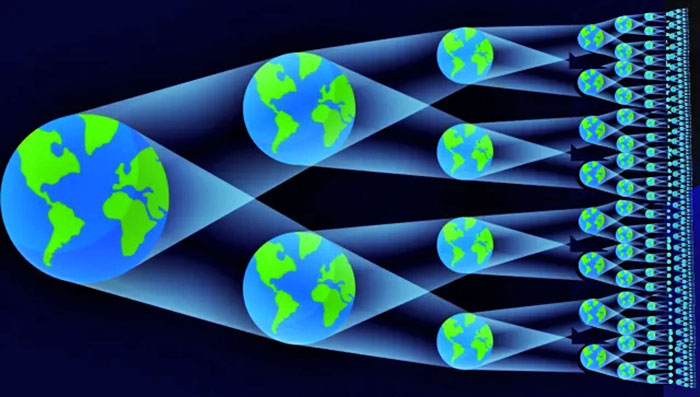
Credit: E. Siegel/public domain
ES:
I agree with a lot of this: that our senses do inform not
just how we make sense of the other phenomena in the world, but
how our intuition works.
And I feel like this is both a blessing
and a curse for us. I will tell you something that will probably
not go over very well with my audience: I find it just deathly
boring when people argue over interpretations of quantum
mechanics, that people argue which interpretation is best.
By
going into this quantum realm, we have finally encountered
something that is foreign to our intuition, yet we can write
down the rules it obeys and we can calculate everything that's
calculable about this system and what the probability
distribution of outcomes of this system will be under a huge
variety of experimental conditions.
And yet, that's not enough for us. We have this idea that people
need to somehow make sense of it as though describing it
physically is not exactly how you make sense of it.
We have this
need to make it fall in under a more intuitive framework. And
honestly, I think that's where we go wrong. I would assert that
it would only make sense that what aliens would derive as
physics would be what a mathematician would call "isomorphic" or
"holomorphic" to our own interpretation of physics: to our own
view of how it works.
Maybe they have different ways of
describing it, maybe they have different terms that they use and
maybe they have different observables that they measure. But at
the end, it's going to be an equivalent underlying law.
DW:
Well, you know, my personal feelings are that we don't know,
of course, we can't know, and I'm excited to meet the aliens and
actually find out. I think my role here today is to argue the
other side of this and to suggest that there's a broader
spectrum of possibilities than we might initially imagine.
Would
aliens have developed an alternative theory? And I agree with
you that a lot of the questions that people struggle with, like
about quantum mechanics, those are the philosophical
implications of the physics, and you don't strictly need to talk
about that if you just want to do the physics.
If all you're
going to do is do the calculations and predict the experiments
you don't really care about like, "what is real" and "what does
it mean, man?"
But I think that that ignores what physics is about for some
people. For some people, yes, it's just let's predict the
outcome of the next round of
experiments at CERN or in space.
But for a lot of people, physics is there to answer those
questions, to tell us how the Universe works, what is the story,
what's going on behind the scenes.
And I think that in the end,
that's actually a little bit inescapable.
Even if you want to
just take the mathematics and use it to calculate, that
mathematics and that theory is always doing something, is always
telling us something about the invisible aspects of the
Universe. The mechanics are going on behind the curtain.
Take general relativity: there's this notion that space has a
metric on it and has this invisible curvature, which is the
reason why things are moving. And that describes reality very,
very well, but it's kind of an invisible machinery we have added
to the Universe that we use to make these calculations.
And so
when you ask, could aliens have another theory of physics and
does it have to be completely isomorphic to ours? There's not a
known answer to that question. And philosophers of physics argue
about this endlessly.
Is it possible to have another theory of physics which is not
isomorphic: which doesn't just map directly like from fields to
"schmields?" Maybe they have a completely different set of
concepts. Is it possible to do that? Well, in principle, it
should be. I mean, any set of data you have, if you measure the
trajectory of a ball flying through the air, you can always
explain it with one curve.
And there's always an infinite set of
other curves you could use to describe the same data. Because
you don't have infinite data about where the ball went, you
could fit lots of different curves to it. And even if you did
have infinite data, there would always be gaps in those data
measurements. It's always something you don't know.
And so, in
principle, there is always an alternative hypothesis that could
explain the data.
Is gravity a force? Is it just the curvature of space? And so I
think it is difficult to imagine aliens coming up with a very
precise set of machinery that can predict the outcome of
experiments at CERN and quantum experiments and general
relativity down to 17 digits without using the same machinery or
machinery that we could map to ours.
That doesn't mean that it's
impossible.
To me that's exciting because it tells us something
about the nature of truth. Like what happens if aliens show up
and they have a completely different theory that cannot be
mapped to ours and yet is just as effective? That would be mind
blowing. It would tell us that our description of the Universe
is just a description, not the description.
It is difficult to
imagine, and I'm personally skeptical that it's the case, but we
have no strong argument, no proof that there is a unique
description of the Universe.
Instead of an empty, blank, three-dimensional grid, putting a
mass down causes what would have been ‘straight' lines to
instead become curved by a specific amount.
In general
relativity, space and time are continuous, with all forms of
energy contributing to spacetime's curvature.
No matter how far
away you get from a point mass, the curvature of space never
reaches zero, but always remains at a non-zero value, even at
infinite range.
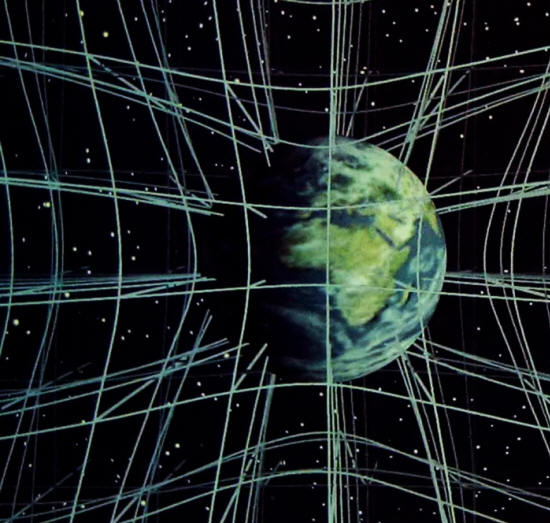
Credit: Christopher Vitale of Networkologies
and the Pratt
Institute
ES:
I can imagine aliens out there that have a completely
different way of looking at the world, of perceiving the world,
of interacting with the world, and maybe a different set of
mathematical machinery that's either more restrictive or less
restrictive than our own.
For example, if we work in physics, we
say the sum of all of the probabilities of every possible
outcome occurring have to add up to 100%.
But if aliens didn't
have that concept of probability, or if aliens had a more
restrictive concept of probability, perhaps they would have
wound up with a completely different way to formulate, you know,
their sets of outcomes.
Perhaps if aliens hadn't developed complex numbers or the
quaternions or the octonions, they would have said, well, you
you can't use these complex numbers in your calculations, but we
pull the real part out of this and we have a formula for working
with this in terms of oscillations that we use instead. And
that's how we devise it.
Maybe they don't have fields and maybe
they don't have potentials, but I have a very hard time
believing that they wouldn't have something that would give an
extremely close approximation to what our close approximation of
reality looks like.
Because that's really what physics is at the heart of it, it's
not saying "this is reality." It's saying this is the best model
of reality that we have come up with for interpreting the full
suite of data.
And I would argue that unless the intelligent
aliens are also doing some version of that, then they wouldn't
be doing science and they also wouldn't be able to reach the
level of technological advancement that we ascribe to an alien
civilization that would be capable of either reaching us through
an interstellar journey or communicating with us through
interstellar communication
DW:
Well, I think, Ethan, that you're probably very unusual
among physicists. I think the vast majority of physicists are
not comfortable saying physics is just the model and we have no
idea what reality is. That's very sort of agnostic about the
nature of the answers to the questions I think a lot of people
have.
For example, if I walk around CERN and ask folks,
"Hey, is
the Higgs boson real or is it just part of our model to describe
our experiments?"
They would look at me like, you know, did you
have some bad coffee or something, you need to go back to sleep
for your jet lag? Of course the Higgs boson is real. They won a
Nobel Prize for predicting it and then we discovered it.
Because
I think a lot of people naturally make that leap to say, look,
our physics is very accurate and therefore it's describing
reality. It's not just a very effective model.
I think there is an important distinction for a lot of people.
And that's really what this question is asking.
Do aliens do
physics the same way we do is asking about the universality of
our physics.
Is it just a model and is it the only possible
model?
I want to come back to this question of like, do those
sharks have to do science in order to communicate with us?
And
do we have to use mathematics as a foundation of our language?
Do we have to have developed science the same way?
Assume that
aliens are doing science and they're using mathematics and they
see the world the same way we do and they're interested in the
same things that we are and they ask the same questions and they
would accept the same kind of answers.
Even in the best case
scenario for your human/alien scientific overlap, we might still
not have a lot in common depending on the order in which science
develops.
You're the kind of person who's played Civilization or SimCity
or whatever, there's this sort of natural instinct to believe
that the way we've developed our understanding of the Universe
is the only way: that it's sort of linear.
You find this out,
then you find that out, then you get gunpowder, dot dot dot,
spaceships. But, you know, history shows us that there's a lot
of randomness and disorder. In fact, as you say, a lot of the
reasons we figure stuff out is because mathematicians developed
the tools we needed, not because they cared.
They were just nerding out about numbers or patterns. For example, all of the
developments in geometry at the end of the 1800s, those folks
didn't care about gravity. They were just interested in surfaces
and geometry and thinking about these things. And then Einstein
was like, Hey, this is exactly the tool I need to solve this
problem.
And there's lots of other examples.
Essentially, that the questions we're asking, the path that
we're going on to understanding the Universe is not the only
path.
Even in a scenario where we have essentially complete
perfect biological and philosophical overlap with the aliens, I
think we'll be surprised to find how different their trajectory
was.
A cross-section of the Wealden Dome, in the south of England,
which required hundreds of millions of years just to explain the
erosion features observed, with fossils of past life found in
the different layers.
The chalk deposits on either side, absent
in the center, provide evidence for an incredibly long
geological timescale required to produce this structure: longer
than any contemporary explanation for the Sun's energy could
have provided in the late 19th century.
This was noted by none
other than Charles Darwin in the mid-1800s, and would present a
puzzle that would not be resolved until the process powering the
Sun, nuclear fusion, became understood.
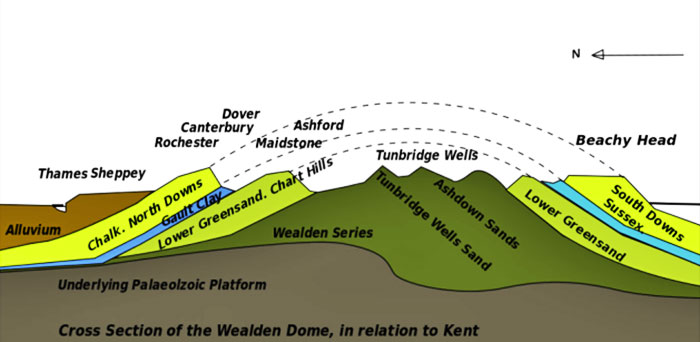
Credit: ClemRutter
Wikimedia Commons
ES:
I agree with that.
I think that's very likely, actually. I
think that the order in which we discovered things here on Earth
is probably unique to us, here, on Earth. For example, when we
first discovered, geologically, what the age of the Earth was,
we ran into this problem that we did not yet understand how the
stars worked and how the Universe worked.
And so we were left
with the uncomfortable conclusion, about 130 years ago, that the
Earth was about twice as old as the Universe was. That obviously
was a flaw in our understanding: of the age of the Universe.
But
perhaps, for an alien, it would be much much easier to determine
the age of the Universe than it is to determine the age of their
home planet based on the order that they discovered things. So
it's quite possible that things would have developed very
differently.
But I would throw back at you, if I wanted to argue the other
side, that when we run into paradoxes where we discover
something and it contradicts a different discovery that we'd
made previously, then we look at that as an opportunity to
advance our understanding. Because both of those things can't be
true at once.
The Earth can't be more than 4 billion years old
if the Universe is younger than 2 billion years old. It was that
sort of tension that led us to uncovering how stars actually
work, where they get their energy from: in the science of
nuclear physics. So I think in terms of the order of operations,
or the order of discovery, that things are almost guaranteed to
be different elsewhere.
But in terms of the laws you wind up
with or their equivalent, I have a really hard time believing
that aliens would not have reached the same level of
sophistication that we've reached. It seems like when you
uncover something about the Universe that surprises you, you're
compelled to investigate it.
DW:
So, you know, do aliens have to be curious?
You described
science as being motivated by our human curiosity. And I totally
agree with you. And I think that something a lot of people don't
appreciate is how much personal, subjective emotion there is in
what questions we choose to investigate.
Why am I a particle
physicist? Because to me, the deepest question in the Universe,
the most interesting one, the one I decided to spend my life
investigating is the question of what are the fundamental bits
and bobs of the Universe?
That's the thing I would ask an oracle if I could speak to it.
Other people want to slosh around in the rainforest getting wet
socks and studying how spiders swing through trees and even more
power to them. I'm so glad that we have a diversity of curiosity
in science, but that's personal.
It's subjective. It's that
people go in different directions because they're curious about
these things and that curiosity is human, but we don't know if
it's exclusively human. Would aliens have to be curious about
the Universe the same way?
There's no mathematical proof of that. That's the question of
what we have in common with aliens. We could find aliens that
are just, you know, piles of slime on rocks. We could find
aliens that seem to be intelligent, but we can't really make a
connection with them the way we can't even with whales and
dolphins here on Earth.
We might find aliens that are very
technological and you ask,
"Do those species have to be, if
they're technologically advanced and can communicate with us or
come visit us, do they have to also have discovered the same
stuff as us?"
I think it's very likely that curiosity and
developing a sort of mental model of the Universe is common
because it's such a powerful accelerator. You want to develop
technology and space travel... like it seems hard to imagine that
you could do so efficiently without also understanding how the
Universe works.
So you can, rather than stumbling blindly
through technological exploration, you can be thoughtful about
it.
This to-scale diagram shows the relative masses of the quarks
and leptons, with neutrinos being the lightest particles and the
top quark being the heaviest.
No explanation, within the
Standard Model alone, can account for these mass values.
We now
know that neutrinos can be no more massive than 0.45 eV/c²
apiece, meaning that the difference between a neutrino's mass
and an electron's mass is more than three times as large as the
difference between the electron's mass and the top quark's mass.
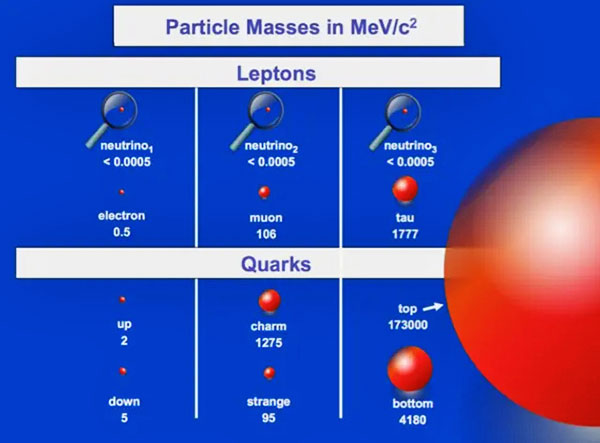
Credit: Luis Álvarez-Gaumé
CERN Latin American School of HEP,
2019
ES:
I'm not saying necessarily that everyone gets fascinated by
radioactive decay the same way we do or gets fascinated by the
physics going on inside the Sun.
But I bet you at some point
aliens would have discovered neutrinos and anti-neutrinos. I bet
you at some point they would have discovered CP violation in the
weak interactions.
I bet you at some point they would have
discovered the Sakharov conditions for generating a
matter-antimatter asymmetry in the Universe, it seems like if
you look at the Universe at a certain level of detail or with
also knowing certain other things about the Universe, you're
pretty much guaranteed to say,
"Hey, I see something funny here.
I see something that doesn't line up with the basic predictions
or assumptions I would have made previous to this. Let me
investigate it further."
That spirit, that curiosity is what leads to science and it's
why I'm so fond of reminding people that if we lost all of the
scientific knowledge we ever gathered here on Earth, we lost all
of the data, we lost all of the methods, we lost all of the
records of every experiment, measurement, observation that was
ever taken or conducted, we could go out, observe the Universe
today and reach those same conclusions from scratch just by
starting science over again.
It might take a while and we might
not follow the same path to get there, but we would eventually
find the same laws governing reality because the same laws
govern reality everywhere and at all times. And I don't think
you're arguing against that.
DW:
I think this is really fascinating because, you know, ask
yourself, instead of talking about muons and anti-muons, zoom
out a little bit and ask yourself,
"Would aliens develop the Navier-Stokes equations?" You know, "Would aliens have developed
Newton's approximation to Einstein's gravity?"
These are
effective theories.
They only work in certain situations.
They're not a fundamental description of the way the Universe
works. They work in a certain phase of the Universe, when the
temperature is right, when the speeds are correct, when the
density is correct. They're effective and they're powerful, but
they're not reality in any way.
It turns out that all of our theories of physics are like that.
Even our description of what we now call fundamental physics, of
electrons and neutrinos, these are effective theories. We don't
know what's going on underneath. We don't know if this is the
deepest layer of reality
In fact, we suspect strongly that it's
not, that these are morally equivalent to Navier-Stokes
equations and other effective theories of the Universe. And in
that sense, they're valid within some boundaries.
The way that the Navier-Stokes equation works really well for
fluids, but once you freeze it, it's totally irrelevant. Once
you boil it in the vapor, it doesn't work very well. Only in
certain boundaries does that effective theory apply. That's also
true for all of our theories of physics.
They apply within
certain boundaries. You make some assumptions and then you can
derive effective laws of physics with assuming on the grounds of
those assumptions and that limits the applicability of those
theories.
And what we don't know is if each of those effective
theories of physics is like a patch to some greater truth or if
they're just effective descriptions. You can't start from, for
example, the Standard Model and predict the weather, right? It's
totally impossible to make these leaps.
In fact, only with a few cases like the ideal gas law, can we
start from particles and derive some sort of zoomed out
effective theory. So we're left with this patchwork of
explanation of the Universe that is very powerful within
boundaries.
But we don't know if we could eventually stitch it
together into some larger truth or if that larger truth even
exists or if all we have are these effective theories. And so if
what we're doing is just describing the Universe with effective
theories, then what the theory will come with depends on the
patch you're looking at.
Are we curious about this kind of phenomenon? Only if aliens are
curious about fluids are they going to develop Navier-Stokes
equations.
So if you expect aliens to show up and talk to us
about fluid dynamics, you might be very disappointed. And so the
other things that you mentioned, CP violation, et cetera, those
also exist within the context of our effective theories.
And if
aliens have taken a different approach, different assumptions,
zoomed in on a different level or chosen a different patch of
the Universe to focus on, they could have a very different set
of effective theories that also work to describe the Universe,
right?
But could be sort of incoherent when we try to bring them
together with our set of physics.
This reconstruction of particle tracks shows a candidate Higgs
event in the ATLAS detector at the Large Hadron Collider at
CERN.
Note how even with the clear signatures and transverse
tracks, there is a shower of other particles; this is due to the
fact that protons are composite particles, and due to the fact
that dozens of proton-proton collisions occur with every bunch
crossing.
At higher energies, discoveries that don't appear at
lower energies become possible.
Modern particle detectors are
like a layer-cake, with the ability to track the particle debris
in order to reconstruct what happened as close to the collision
point as possible.
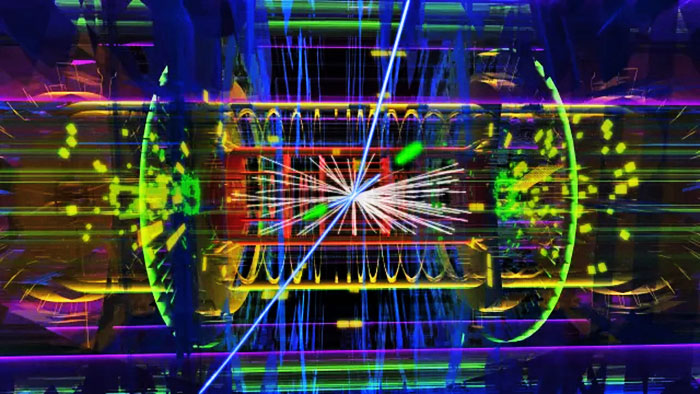
Credit: CERN/ATLAS Collaboration
ES:
I actually agree with all that you said here this time and I
want to go back to something you brought up earlier where you
talked about imagining going through the hallways at CERN and
asking other physicists, is the Higgs boson real?
Because, you
know, what I would say if you would go up to me and ask me is
the Higgs boson real? I would probably tell you it is real. I
probably wouldn't say, well, it's our best approximation of what
reality is. But I would say it's real in the sense that any
other particle in the standard model is real.
If you would ask
me about that in detail, I would say,
"Well, listen, I know that
this is our best approximation of reality.
Within the framework
that we currently understand reality, at the deepest or most
fundamental level, the Higgs boson is a particle just as much as
the photon is a particle or a gluon is a particle or a quark or
an electron is a particle.
These are particles because we can
measure certain properties that they have and they behave
particle-like under certain sets of conditions."
What you just brought up now is something I often communicate to
people in just a slightly different language, is that I say
every physical theory that we've ever concocted has an
established range of validity.
It has this set of conditions
that this is a good model of reality under. And if you go
outside that range of validity, suddenly it may or may not hold.
There are plenty of things that we have as our current best
approximation of reality and beyond a certain limit, whether
that's in energy, in temperature, in density, whatever.
We don't
know if those laws still hold, if those rules still hold. We
don't know where those rules break down.
But I also think that if you're going to invent, you know,
rocketry and interstellar travel, you are going to need to
understand what matter is made from and how it combines together
in ways that lead to the release of energy: energy that will
allow you to propel yourself across interstellar distances.
I
like to think that if you want to transmit a broadcast of
sufficient power and that's sufficiently targeted that you know
where to send this high-power signal to in order to effectively
communicate, similarly, you would need to have some basic
understanding of physics at least that's equivalent to how we
understand it or you wouldn't be able to get there.
Now, you
might be able to concoct some clever biology where they can do
this without even needing to know that they're doing it, and
then I would argue to you,
"Well, is that alien species even
technologically advanced, or are they just really really
fortunate with the types of organs that their history of life on
their world endowed them with?"
DW:
Yeah, it was really fun and in the book I actually write a
bunch of these little counterfactual hypothetical situations. So
the book is not just like,
"here's a bunch of philosophical
questions" like "here's an example of what first contact might
be like with aliens that are different in some weird way that's
hard for us to grasp."
I think that you're right about the question of what people in
the hallways of CERN would say, because I think that most
physicists don't think much about the question of "what is real"
and "what does real mean?"
Because in the end, it's a
philosophical question, right? When we're asking, "is the Higgs
boson real," we're asking about the difference between it being
in our model and it being there when we're not looking. And
that's not a science experiment you can do.
You can't conduct an
experiment to find out what would happen if you didn't do an
experiment. It's really a question of philosophy.
I think that that philosophy gets a sort of a bad name in
physics most of the time. I think that around the holidays,
certain people are probably dismissive of philosophy, like,
"Whatever, we're just doing the calculations. Who cares about
the philosophical questions?"
And yet they have strong
philosophical opinions about what real is. I think if you
explain this to people, what we mean by "is it there where we're
not looking?"
They'll be like,
"Of course it's there. What are
you, crazy stuff, smoking banana peels?"
So I think businesses
in general have strong philosophical opinions yet tend to look
down on philosophy weirdly. But I think that philosophy really
informs these questions. And it really helps us think about what
our assumptions are.
There's a class of philosophers who argue that all we have are
patchwork explanations of the Universe. That between the
patches, there is no methodological explanation for it. There's
this book by Nancy Cartwright called
How the Laws of Physics
Lie, which suggests that you can't even test what's happening
between the patches because the experiments are too complicated.
Take a simple example.
Drop a penny outside, and, can you
describe it? Yes, you can use Newton's equations to describe it.
Okay, now turn it into a leaf. Can you describe it? Sure, you
can add air resistance. Your theory has to get a little bit more
complicated, but you can still describe it. Okay, now add a
tornado.
So the leaf has very, very complex interactions and add
10 leaves and have them stuck together by rubber bands. And I
can keep adding details to this situation until it becomes
impossible for us practically to make a prediction for what's
going to happen.
We're already there in our atmosphere, right? We can predict the
weather a few days out, but not a week or two weeks, so Nancy
Cartwright's argument essentially is that there's always some
situation where we are incapable of predicting what happens.
And
so it might be that there are corners of the Universe where, as
she says, what happens, happens by half.
And to me, that's very
alien to imagine that the Universe could be not following some
laws, that there isn't some set of rules out there that
determines what really happens?
But Cartwright's argument essentially is we can't know that;
that's a philosophical assumption. That's a philosophical
position: to say the Universe has to be logical, has to follow
laws. So far, in our experience, it has, but again, we're not
guaranteed.
And so one of the questions of this book is to help
us get our assumptions and wonder, well, which of the things
that we assume are ironclad, and which are we just assuming? And
which things do we actually have data to support?
And a lot of
people, it turns out, feel just as strongly about philosophical
opinions as topics that we do have data to support them.
It's possible to write down a variety of equations, like
Maxwell's equations, that describe the Universe.
We can write
them down in a variety of ways, but only by comparing their
predictions with physical observations can we draw any
conclusion about their validity.
It's why the version of
Maxwell's equations with magnetic monopoles (right) doesn't
correspond to reality, while the ones without (left) do.
The
displacement current term (the second term in the fourth
equation) arose from Maxwell's attempt to fix the incompleteness
in electricity and magnetism that existed prior to his work: an
important theoretical leap that turned out to accurately reflect
reality.
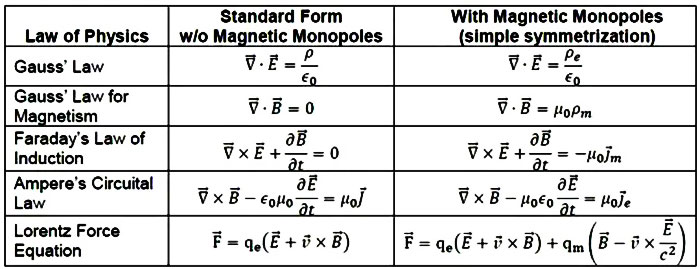
Credit: Ed Murdock
ES:
I would argue that there are conditions that we've
encountered many times in science that lend itself towards a
greater picture of unification.
And I would say one of these
things was when Newton, among others, recognized that the law of
gravitation that governs how bodies fall here on Earth, as
investigated by Galileo and others, is the same law of
gravitation that causes the planets to orbit the sun and the
moons to orbit the planets.
This was a huge insight, and yet
it's extremely profound. I have a very hard time imagining that
aliens wouldn't notice that insight.
It was a remarkable insight in the 19th century when Faraday and
Ampere and Maxwell brought the previously unrelated phenomena of
electricity and magnetism together, under the same footing,
where we now know it as electromagnetism.
Moreover, there's the
fact that they are not completely symmetric: because we have
fundamental electric charges, positive and negative charges, but
we don't have fundamental magnetic charges, we don't have north
and south magnetic monopoles.
Looking at these ideas where
unification has helped, going all the way into modern particle
physics and noticing that, oh, the electric force and the weak
nuclear force are not separable, but they are intimately related
to one another. The electroweak force is the correct scheme for
unifying these.
They lead to the predictions of, among other
things, the W, Z, and Higgs bosons, which agree with reality in
contrast to all of the other possible predictions that are out
there.
I would say it's reasonable to expect aliens would get this far.
And I say this as someone who, honestly, I don't think physics
has gotten very far. Like it's amazing what we've done. I could
spend my lifetime learning all the incredible details of what
we've done. But I also look at all the unexplored territory out
there. I look at the, you know, 15 orders of magnitude between
where the Large Hadron Collider has gotten us and where the
Planck scale is.
I look at the nine orders of magnitude between
the highest energy cosmic rays and where the Planck scale is.
And I say, wow, there's so much more physics out there to be
investigated. I look at the fact that we have a fundamental
limit on our particle sizes if they're no bigger than 10-19
meters.
And then I go, where's the Planck scale? What? 10-35
meters? Look how much more of nature we have to investigate out
there.
I look at us still the way Isaac Newton looked at himself: that
we are like children playing on the shore of the great cosmic
ocean, where we've just waded into the waters, but not even up
to our necks. And we look at the pretty pebbles and we say, look
at this beautiful cosmic ocean.
And yet we are so profoundly
ignorant of the full ocean that's out there. I would say,
honestly, Daniel, if we meet intelligent aliens and they are not
far more scientifically and technologically advanced than we
are, it would be a huge disappointment.
DW:
I know. It's so frustrating to imagine that they could be
out there, right now, and they could have answers to these
questions. They could just beam them at us, or show up and
explain to us. And I think that's the fantasy that fuels this
book for me: is that I want that to be true. I want them to show
up and fast forward us into our scientific future.
And
essentially this is wondering,
"What could that scientific
future be? And what surprises are lying in wait for us?"
Because
I'm almost certain that there are some fundamentals, some
assumptions we're making about the nature of the Universe that
are wrong.
The history of our scientific development is discovering, one by
one, that our intuition has misled us and that assumptions we've
made about the way the Universe has to work - like things have
to have a location and a velocity at all points in time, if
things are here and then there they have to go from here to
there - that just make sense, of course it's true and totally
reasonable, statements like that have been upended of course by
experiments that have shown us that the Universe doesn't operate
that way at the smallest scale.
And so we need to maintain that
skepticism, even in the face of statements that seem to make
obvious sense. If we don't know, for sure, if we haven't proven
them, then we can't rely on them.
So take your argument that we certainly can model that tornado
of leaves because we've modeled two things and then three things
and then four things. And as we keep pushing our computational
abilities, things do eventually work.
That's true, but there's
always something we haven't modeled. Just because we can do two
and three doesn't mean we can do 47,000. It's possible that some
other dynamics emerge in those scenarios that are not
describable by our physics.
And Nancy Cartwright makes this
extra leap, which I struggle with, I will admit, but
philosophically, I think she has some standing to say that we
don't know that there even are laws that describe those
scenarios because, by construction, we can't test them because
we define them to be in the places that are too complex, too
chaotic for us to model.
There will always be such corners of the Universe, because all
of our theories rely on some assumptions, some approximations,
and have some boundaries.
And so it's not necessarily true that
we can grow those theories together to make them make sense of
the Universe. And on the other hand, you're right that we have
this incredible, compelling history of unification of ideas
coming together and clicking together in the most satisfying way
to reveal something deeply true about the Universe.
That's
really powerful, and suggests something else about the Universe
that I think a lot of people feel we must have in common with
aliens.
It's generally assumed that at some level, gravity will be
quantum, just like the other forces.
While the semi-classical
approximation for computing the decay of black holes involves
performing quantum calculations in the classical background of
Einstein's curved space, that approach might not be valid for
capturing the full suite of physical behavior that the outgoing
radiation possesses, particularly as far as information is
concerned.
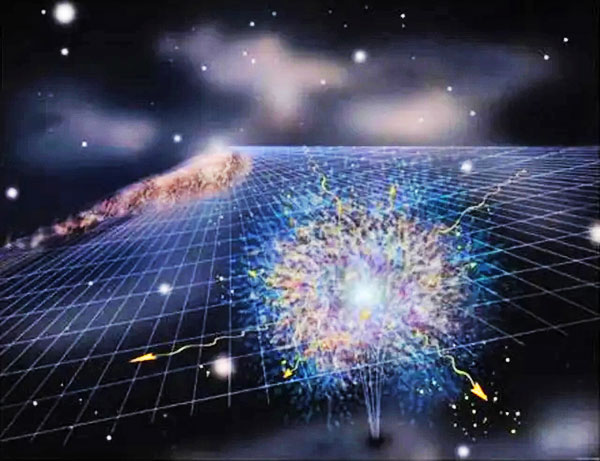
Credit: Aurore Simmonet
ES:
As for Nancy Cartwright's assertion:
she may be right...
There
may be problems out there where you need to understand laws that
we have not yet uncovered in order to solve them. But the leaves
in the tornado is not one of them. So that's not an example I'm gonna bite on.
If we understand the laws of physics, and the
boundary conditions, and the initial conditions of our system,
then with enough computational power, we could predict those
leaves and their motion arbitrarily far into the future. And I
have no problem asserting that as far as the "without numbers"
point of view goes.
I think it's probably fine that you can make that coarse level
of "almost science" work. But what separates, for me, modern
science from any ancient philosophy that we attempt to do
science with is, the quantitative footing. That science doesn't
just ask you what happens.
It says,
"How much?"
"In what
amount?"
"By what quantity, by what measure?"
Bringing those
things together, answering the "how much" question, "what
happens and by how much," that's what makes it science.
That's
what makes things go. That's what allows us to be efficient.
That's what allows us to make accurate predictions to, you know,
10, 15, 17 significant figures that then go out and agree with
experiments.
And where they disagree, that shows us where there
are the flaws in our theories. If all we had was this
qualitative explanation, you know, it might make some ancient
philosopher like Plato very, very happy that we've come this
far, but for modern science, we demand much more than that.
DW:
Let me touch on the core issue: the method of science
itself. You refer to this process of modern science, which I
think you're contrasting with ancient ways of thinking that are
just sort of exploratory and wondering about the Universe and
investigating things in our minds.
I think it's illuminating to
remember that what we call modern science is very new.
The way
that we talk about science, the way that you and I have a career
as scientists, we have institutions in our culture, at least for
now, that we call scientific institutions, and the process of
science itself, the way we go about it, is fairly new in our
development.
But we have been asking questions and checking things. There's
this story that the Greeks weren't scientific, but they did
experiments.
Like Eratosthenes measured the radius of the Earth
using a stick and shadows. That's an experiment. He was
quantitative about it. So I think the development of science
itself is more gradual than people like to think, which is
important to consider because it suggests that maybe science
isn't, like, at some final plateau.
I think a lot of people
imagine,
"Okay, we found science and now we're sciencing."
But
the process itself of science is developing, it's continuing to
change. And it's hard to imagine that in a thousand years or a
million years, if we're still here, humans will still be doing
science the way that we are doing it now.
It's likely they'll have some other new addition to the process
or direction they've taken, which makes it vastly more powerful
to interrogate the Universe and reveal its structures. In the
way that adding empiricism, or adding simulations, has to our
modern process of science.
And so if we're talking about "are
aliens scientific?" well, maybe they are, but likely it's very,
very different from the ways that we are scientific. They could
look back at us and imagine like, "Wow, your science is all
really primitive.
You haven't even figured out that you should
do X, Y, and Z." Things that we haven't imagined.
And so I think also it's possible that aliens are scientific in
a different way. If we're open to imagining that the
developments of science, the levels of knowledge that have been
revealed by the process of science, could go in very different
ways. If you reran the Earth as an experiment a thousand times
(or of course on alien planets), then also the process of
science itself could develop in a different order or go down a
different path.
And what we call science, what we view and find
so important as our method of discovering the Universe, could be
culturally very different on an alien planet.
You know, let me end just with a silly example. I imagine that
when aliens come, once the linguists have figured stuff out
that, you know, we're going to be at the chalkboard talking with
their physicists, but do they even have physicists? Do they have
creatures who spend their lives investigating these questions?
Maybe they have a very different social structure, and who will
they send to talk to us? If alien physicists came to earth 500
years ago, we might send our priests or something to them. So
it's funny to imagine. Is there even the alien equivalent of you
and me?
Who are the alien Daniel and Ethan that we could talk to
if they even did arrive?



